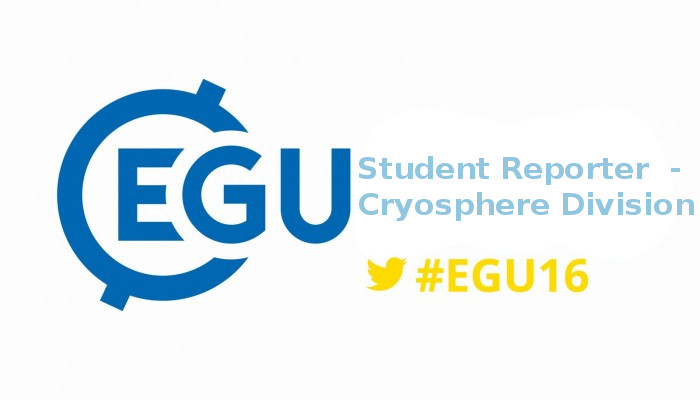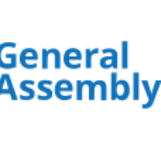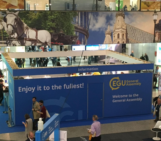
Hello everyone! My name is Kathi Unglert and I’m a PhD student in volcanology at the University of British Columbia in Vancouver. I will be reporting for the Cryospheric Sciences blog during the upcoming EGU General Assembly as part of the “Student Reporter Programme”. With the meeting only a few days away, I thought I’d put together a quick guide how to make the most out of a whole week of conferencing. Hopefully you’ll find it useful! So here we go:
Preparation
Usually I would tell you to start your conference preparation way before the conference. Many conferences have a short course/field trip/professional development program around the actual conference dates. These things fill up fast, so look at the program and decide what you want to do early on (and sign up!). Often these events have discounts if you sign up early, so that’s another bonus. However, given that it’s only 3 days before the meeting starts I guess we’ll skip this step. So here’s what’s next:
Decide on a theme
Conferences are really bad for people like me, who sometimes try to do everything. There are so many opportunities and interesting things going that it’s usually impossible to take advantage of everything. The first step can be to choose a few sessions and sit all the way through them, instead of picking individual talks. You avoid running around trying to find rooms at the last minute, missing half of the talk you really wanted to see because the previous one in a different room ran late, and often the talks with the least appealing titles turn out to be the best. It can also help to identify a theme for the conference. For example for this EGU General Assembly my theme will be – you guessed it – science communication! I will leave my usual field (volcanology) and try out the mostly unknown, cold waters of cryospheric sciences. I am hoping to learn lots of new concepts that may apply to my own field. I will also do my best to view everything from a reporter’s perspective and relay anything I deem cool or fun or important to you! I might try to get into a few press conferences, and go to some of the “Meet the Editor” meetings. So much to do! Of course your “theme decision” doesn’t mean that you can’t do anything outside of the theme, it just helps to focus your attention and time. Need some inspiration to decide on your theme for EGU? Why not check out this early career guide, or some of the short courses!
Do some pre-conference research
There might be a person attending the conference with exactly the kind of job you could see yourself in. Or the researcher who came up with this awesome method that you’ve been using already, but that you still have some questions about. Or your friend from your undergrad who now lives on a different continent and whom you haven’t seen in 3 years. There are lots of reasons to look at the conference program ahead of time. When you see somebody in the program that you would like to meet, get in touch with them before the conference, and maybe you can arrange a meeting over a coffee, in a specific session, or over dinner (see Have fun).
Check for volunteering options
Some conferences give students the opportunity to get involved. That could for example be a contribution to the planning of the actual meeting, or some student or social events around it, which of course works well if the meeting is happening close to where you live. Another option is to volunteer your time during the conference. At EGU, my reporter role is a voluntary gig that I was more than happy to apply for. I’ve been interested in science communication for a while, so it seemed like a great opportunity to try out what it’s like being an “actual” reporter, and write about things way outside of my field. Plus, I might meet some famous reporters and bug them with lots of questions if I can – what’s not to like? The networking aspect opens up another topic:
Bring business cards
You might think that as a student why would I need a business card? Turns out it’s maybe even more important as a student than at a later stage (despite the fact that you don’t have a business…). Networking is all about being interested in other people, them being interested in you, and most importantly to leave a lasting impression. You never know when you might meet a person again, and in what situation. That doesn’t just apply to professionals in your field who are higher up the food chain, but even more so to your fellow students. They will be your future colleagues, and relationships between colleagues – even in different disciplines – can go a long way. I’ve been to many conferences before, and never thought about the business card thing. Man, do I wish I had. How many times have you been at a conference, awkwardly scribbling down somebody’s email address on a random piece of paper, only to lose it or to be unable to read your own writing after the fact? Business cards are a simple, tidy way to keep track of all the people you meet over the course of a conference, and a great way for them to remember you, too.
Wear your name badge somewhere easily visible
When I went to my first conference as a wee Master’s student, I thought it was maybe not super fashionable how everyone runs around with a badge around their neck. Turns out it’s actually super important. You want people you meet to have a visual of your name, to help you to leave a potentially lasting impression. That applies even more when you have somewhat complicated/foreign/rare name (I can’t expect non-German speakers to automatically make the connection from the spoken “Ka-tee” to the written “Kathi”, but I also refuse to anglicize my name. The name tag does help…). Also, for the slightly not so tall ones among us, it’s good to tie a knot into the lanyard or pin your badge to the side of your scarf or the collar of your shirt. Nothing more awkward than somebody having to bent down in front of your crotch to read your name…
Follow up
That one is a simple one – when you meet somebody interesting make sure to follow up with a short email on the day, just to refresh their memory. Following up, of course, requires some time in the evening set aside for that purpose, which leads to this:
Say no
Sometimes you’ll have to say no. There are so many things going on at conferences, from project meetings through evening receptions and dinners/drinks with old and new friends. Once in a while it’s good to say no. Set aside 1-2 hours in the evening to be able to wind down, process all the awesome experiences, and follow up on anything that the day brought (see Follow up).
Say yes
Sometimes you’ll have to say yes. There will always be surprises, opportunities you didn’t expect. Show your face at the reception you’ve been invited to, even if it’s only for an hour or so. Go to sessions that you wouldn’t usually go to because it’s completely out of your field. I went to a lunchtime presentation about Spacecraft Landing Site Identification on Mars at a conference a few years ago, and learned that they use some of the same methodology that I use, despite a complete lack of overlap of my research with theirs. How cool is that? For this EGU, I highly recommend socializing with some fellow early career cryosphere people at our “Icy Outing” (more info here)!
Last but not least, the most important thing:
Have fun!
Yes, the conference is the reason why your supervisor paid for your flight, your hotel, and your food. But that doesn’t mean that you have to exhaust yourself to the point of collapse by day 3, when the conference lasts for another 2 days. Instead, pick a morning or afternoon with somewhat less relevant sessions and explore Vienna. Go to a museum. Take in all the history. Walk in Empress Sisi’s footsteps. Or do some shopping for the upcoming summer. Sit down in one of the many amazing coffee shops and enjoy your obligatory “Wiener Melange”. Use some time to catch up with old friends at a “Heuriger” or grab some food. If you don’t know what any of these words mean, look them up right now! Another great thing to do is spending some time getting to know new people. At a conference a few years ago, I went to a tweet-up, for example. Someone had booked a table at a pub close to the convention center, and invited fellow science-y social media people to meet up, where people only knew each other from Twitter or their respective blogs.
Doing all these things is a great way to wind down a bit (see Say no), to be refreshed after a little break and to take in more science in the following sessions. Conferences are so much more fun if you put a little bit of effort into spending time away from the meeting itself! I can’t wait to learn about more exciting science, meet fascinating people, and catch up with old and new friends during EGU!
(Modified from a post originally published on Oct 26, 2014 on http://volcano-diaries.blogspot.com)
Edited by Sophie Berger, Emma Smith and Nanna Karlsson
Kathi Unglert is a PhD student in volcanology at the University of British Columbia, Vancouver. Her work looks at volcanic tremor, a special type of earthquake that tends to happen just before or during volcanic eruptions. She uses pattern recognition algorithms to compare tremor from many volcanoes to identify systematic similarities or differences. This comparison may help to determine the mechanisms causing this type earthquake, and could contribute to improved eruption forecasting. You can find her on Twitter (@volcanokathi) or read her volcano blog.

![Image of the Week – Seven weeks in Antarctica [and how to study its surface mass balance]](https://blogs.egu.eu/divisions/cr/files/2019/02/Vue_globale-161x141.jpg)

